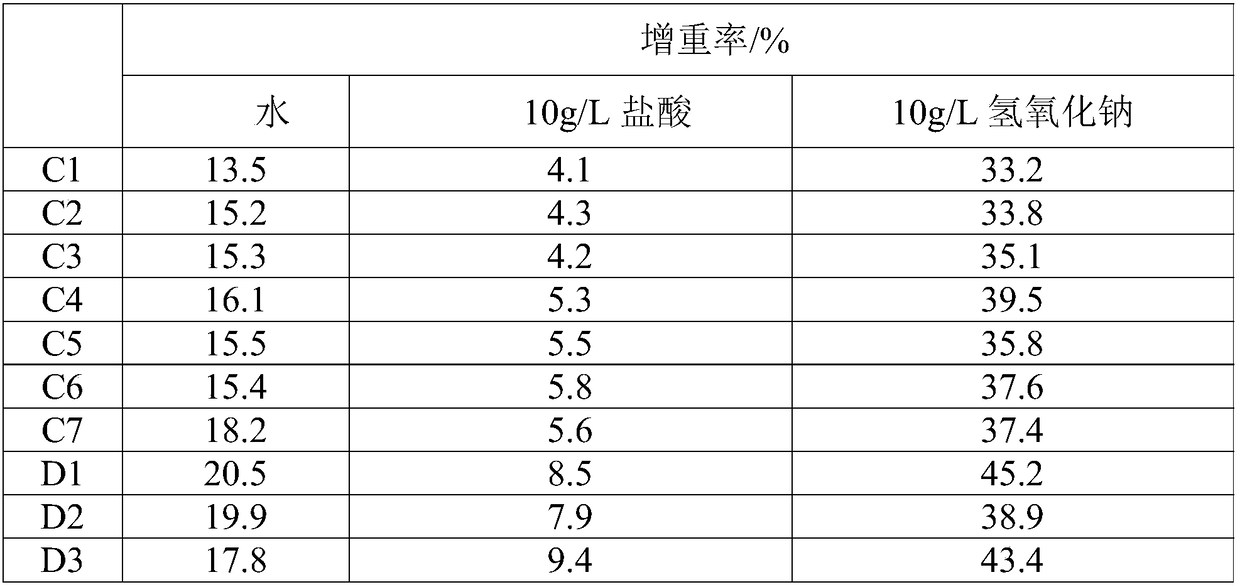Anionic polyurethane modified polyacrylate emulsion with crosslinked core-shell structure and preparation method of anionic polyurethane modified polyacrylate emulsion
A polyacrylate emulsion and polyurethane modification technology, which is applied in dyeing, textiles and papermaking, can solve the problems of poor polyacrylate structure compatibility, lack of structural hierarchy, poor acid resistance, etc., and achieve emulsion stability Excellent, moderate film forming speed, good water resistance and acid resistance
- Summary
- Abstract
- Description
- Claims
- Application Information
AI Technical Summary
Problems solved by technology
Method used
Image
Examples
preparation example Construction
[0017] The preparation method of the anionic polyurethane modified polyacrylate emulsion with crosslinked core-shell structure of the present invention comprises the following steps:
[0018] (1) In the presence of a polyurethane catalyst, the PU active pre-polymerized monomer (i.e. polyester diol, polybutadiene diol, isophorone diisocyanate, dimethylol propionic acid, trimethylol propane monoallyl ether, 1,4-butanediol, polyethylene glycol methyl ether and hydroxyethyl methacrylate) to react to obtain PU active prepolymer;
[0019] (2) mixing the PU active prepolymer, part of the polyacrylate monomer raw material, part of the emulsifier, triethylamine and water to prepare the PUm active prepolymer emulsion;
[0020] (3) Mix the remaining part of the polyacrylate monomer raw material, the remaining part of the emulsifier and water, and stir and emulsify to obtain a PA pre-emulsion; in the presence of an initiator, carry out a pre-polymerization reaction on the PA pre-emulsion,...
Embodiment 1
[0049] (1) Preparation of PU active prepolymer
[0050] 56.465g of polyester diol (PE2348, molecular weight 2300) and 0.987g of polymalene diol (HTPB, molecular weight 2700) were vacuum dehydrated at 110°C for 90 minutes, then cooled to below 75°C, and 37.011g of isobutadiene was added Phorne diisocyanate (IPDI); after the temperature is stable, add 5.365 g of dimethylolpropionic acid (DMPA), raise the temperature to 90°C and keep it warm for 60 minutes, add 0.0245 g of dibutyltin dilauric acid (DBTDL), and keep it warm for 60 minutes; Cool down to below 60°C, add dropwise 13.068g of trimethylolpropane monoallyl ether (TMPME), 0.36g of 1,4-butanediol (BDO) and 5g of polyethylene glycol methyl ether (N120, molecular weight 1000) and heat-retain the reaction for 30min; add 0.0245g dibutyltin dilaurate (DBTDL), heat up to 75°C and heat-retain for 120min, add 40g ethylpyrrolidone (NEP) to reduce the viscosity; then add 4.555g methacrylic acid hydroxyl Ethyl ester (HEMA), react at...
Embodiment 2
[0057] (1) Preparation of PU active prepolymer
[0058] 52.75g polyester diol (PE2348, molecular weight 2300), 0.95g polymasbutadiene glycol (HTPB, molecular weight 2700), vacuum dehydration at 100°C for 90min, then lower the temperature to below 75°C, add 37.011g isobutadiene Phorne diisocyanate (IPDI); after the temperature is stable, add 5.3g dimethylolpropionic acid (DMPA), heat up to 85°C and keep it warm for 30min, add 0.024g of dibutyltin dilauric acid (DBTDL), keep warm for 30min; Cool down to below 60°C, add dropwise 12.57 g of trimethylolpropane monoallyl ether (TMPME), 0.36 g of 1,4-butanediol (BDO) and 5.55 g of polyethylene glycol methyl ether (N120, molecular weight 1000) of the mixed solution and keep it warm for 20 minutes; add 0.036g of dibutyltin dilaurate (DBTDL), heat up to 70°C and keep it warm for 90 minutes, add 40g of ethylpyrrolidone (NEP) to reduce the viscosity; then add 5.85g of methacrylic acid hydroxyl Ethyl ester (HEMA), reacted at 70°C for 60 m...
PUM
| Property | Measurement | Unit |
|---|---|---|
| The average particle size | aaaaa | aaaaa |
Abstract
Description
Claims
Application Information
 Login to View More
Login to View More - R&D
- Intellectual Property
- Life Sciences
- Materials
- Tech Scout
- Unparalleled Data Quality
- Higher Quality Content
- 60% Fewer Hallucinations
Browse by: Latest US Patents, China's latest patents, Technical Efficacy Thesaurus, Application Domain, Technology Topic, Popular Technical Reports.
© 2025 PatSnap. All rights reserved.Legal|Privacy policy|Modern Slavery Act Transparency Statement|Sitemap|About US| Contact US: help@patsnap.com

